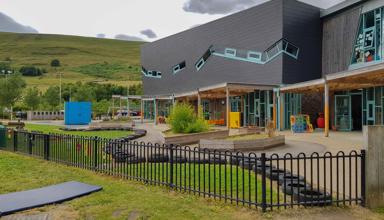On Tuesday (6 June 2017), Assembly Members will debate the general principles of the Additional Learning Needs and Education Tribunal (Wales) Bill and vote whether to allow it to proceed to the second stage of the Assembly’s legislative process.
The debate follows the Children, Young People and Education Committee’s scrutiny of the Bill at Stage 1 (which considers the general principles of the legislation) and the publication of its report on 24 May 2017.
Reform of the current Special Educational Needs (SEN) system is long overdue with the Welsh Government itself recognising current arrangements are ‘no longer fit for purpose’. When introducing the Bill in December 2016, the Minister for Lifelong Learning and Welsh Language, Alun Davies, described it as an ‘ambitious law to create a bold new approach’ and a ‘complete overhaul’ of the way children and young people’s needs are met. This follows many reviews, proposals, pilots and consultations, including on a draft Bill in 2015.
The following sources will be useful for the Stage 1 debate:
- The Research Service’s Bill Summary, including an overview of the draft ALN Code (PDF 2.95MB)
- The Children, Young People and Education Committee’s report on the general principles of the Bill (PDF 1.86MB), following its Stage 1 scrutiny.
(The Constitutional and Legislative Affairs Committee (PDF 1.13MB) and Finance Committee (PDF 370KB) have both also reported on the Bill from their own perspectives.)
What does the Bill do?
The Bill will establish a new statutory framework for supporting children and young people with Additional Learning Needs (ALN) from birth; whilst they are in school; and, if they are over compulsory school age, while they are in further education. The Bill, and the new framework it creates, will replace the separate legislation and arrangements which currently exist for Special Educational Needs (SEN) up to age 16, and Learning Difficulties and/or Disabilities (LDD) post-16.
The new term, Additional Learning Needs (ALN) will be applied for all children and young people up to the age of 25 who are identified as having those needs. The definition which the Bill uses for ALN is materially the same as the current legal definition of SEN. This is that a child or young person has ALN if they have a significantly greater difficulty in learning than the majority of their age group, or if they have a disability that prevents or hinders them from using the education or training generally on offer.
Over 105,000 (23%) school-age pupils in Wales are identified as having SEN/ALN (2015/16 statistics).
One of the Bill’s main reforms is an end to the current system of statementing. Currently, some learners with ALN (around 88%) have their needs met through school-led support at either of two levels (School Action or School Action Plus). Others, with more severe and complex needs (12%), have a statement from their local authority, which provides a legal entitlement to a specified package of support. Instead, under the new system, all learners with ALN will have their needs met under the same type of statutory plan – an Individual Development Plan.
However, there would still be a distinction between some (more severe and complex) cases where local authorities would be responsible for maintaining a learner’s IDP, whilst in the majority of the cases it would be the school or college.
As well as establishing a single age 0-25 system of IDPs for all learners with ALN, the Welsh Government also wants the Bill to:
- Improve collaboration between local authorities and health boards so they can make early, timely and effective interventions; and
- Improve fairness and transparency through better provision of information and advice to families and disagreement avoidance and resolution services.
The Bill also continues the existence of the Special Educational Needs Tribunal for Wales and extends the right of appeal to young people in further education (as well as school-age children and their families). The Bill renames it as the Education Tribunal for Wales.
The Bill requires the Welsh Government to produce an ALN Code. This will provide most of the detail for the way assessments and decisions about provision will be carried out, with the Bill setting the overall framework. The Welsh Government provided the Children, Young People and Education Committee with a working draft of the Code (PDF 2.95MB) on 14 February 2017, which the Committee published to assist stakeholders’ input into Stage 1 scrutiny.
What has the CYPE Committee said about the Bill?
The Children, Young People and Education Committee welcomes the general principles of the Bill and recommends that the Assembly supports the legislation at Stage 1, enabling it to progress to Stage 2 when amendments can be made. However, the Committee’s report makes 48 recommendations for the Welsh Government, which aim to strengthen the legislation and address areas of concern identified by stakeholders and Committee members. The Committee reports:
The evidence received highlights that there will be many challenges in implementing the Bill. Simply passing the legislation will not by itself address the deeper, underlying problems and challenges within the current system. The evidence received also highlights many concerns about the way the new framework is going to work in practice. (para 34)
The CYPE Committee has also highlighted the need for adequate resources, workforce planning and training arrangements to support implementation of the Bill and the Welsh Government’s wider ALN Transformation Programme.
The Committee made recommendations in the following areas. Some of these call for amendments to the Bill itself, others for further detail in the Code, whilst a number raise issues for the Welsh Government to consider more generally in its approach to the reforms. (Numbers in brackets denote the number of recommendations in each section of the report.)
- General principles and the need for the legislation (2)
- The definition of ALN (2)
- Timescales for assessments and preparation of Individual Development Plans (IDPs) (1)
- Responsibility for IDPs (6)
- Template for IDPs (2)
- Additional Learning Needs Co-ordinators (ALNCOs) (4)
- Early years (3)
- Post-16 (1)
- Collaboration and the involvement of the health sector (4)
- Information, advice and advocacy (5)
- Children’s rights (2)
- Welsh-medium provision (5)
- The Tribunal (3)
- Financial and resource implications (3)
- Powers to make subordinate legislation (3)
- Medical needs in schools (2)
One day after the Stage 1 reporting deadline and the publication of the Committee’s report, the Minister issued a letter outlining changes (PDF 241KB) to the Welsh Government’s estimated costs and savings of the Bill. These changes are substantial. The original RIA that was published alongside the Bill in December 2016 outlined an overall saving of £4.8 million over the period of implementation (four years, 2017-18 to 2020-21). The Welsh Government now estimates that the Bill will have an overall cost of £8.3 million during the four years, representing a £13.1 million change. Both the chairs of the CYPE and Finance Committees have written to the Minister to express their disappointment and concern at the timing of this announcement and the degree of the revision in the cost estimates.
What will happen after the debate?
Subject to the Assembly’s approval on Tuesday (6 June 2017), the Bill will proceed to Stage 2 of the legislative process, when amendments can be made by the CYPE Committee. This stage would be completed in July 2017 before the Bill goes back to Plenary for further amendment at Stage 3 and a final vote at Stage 4 on whether to pass the Bill (as amended). It is not known when the new ALN system would be introduced and the Welsh Government is consulting on transitional arrangements.
Article by Michael Dauncey, National Assembly for Wales Research Service.
Artwork produced by pupils at Ysgol y Gogarth, Llandudno.
This post is also available as a print-friendly PDF: Debate on the General Principles of the ALN Bill (PDF, 249KB)






